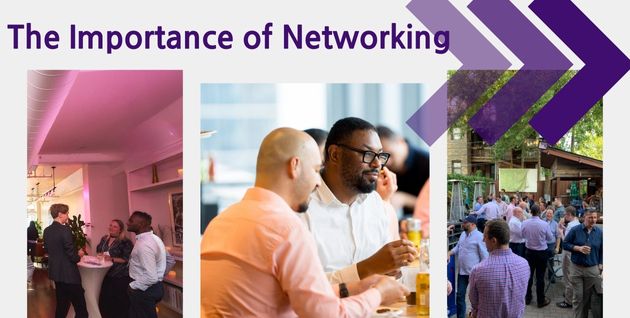The Importance of Networking

Today, it can be easy to feel connected, but many of us know the reality: building meaningful relationships, especially a professional network, is harder than ever. Hybrid work, increased productivity demands, distant teams/colleagues, and feelings of burnout can all leave individuals without meaningful professional relationships that create opportunities for growth, support, and career advancement. External networking, in particular, holds immense potential for career and leadership development and fostering a feeling of belonging, which is essential to all marginalized communities. As we reflect on all the connections that Pride month has brought us, it is important to build on those connections, reach outside of our workplaces, and connect with a broader professional community.
One of the key benefits of external networking is access to a wealth of knowledge and resources that might not be available within our immediate work environment. As Kirk Snyder aptly puts it in The G Quotient, “[when employees] connect with external information, individuals, and resources [they are] provided knowledge they didn’t have, augmenting their ability to start change.” By engaging with professionals from diverse backgrounds, we gain fresh perspectives and insights that can inspire innovation and drive positive change within our organizations and our personal careers. Forbes builds on this thought, writing, “Intellectual ability in different careers is significantly improved upon from contacts we have built with other persons.” These external connections can introduce us to new trends, best practices, and emerging technologies that can enhance our professional capabilities and keep us ahead in our evolving industry.
The wealth of knowledge may also include advice on the next step for your career. The Economist writes: “effective networking has the potential to significantly impact career growth and advancement. Building relationships with mentors, industry leaders, and professionals who have already achieved success can provide invaluable guidance and insights.” As you grow and cultivate your professional network, you also begin to make connections for future job opportunities and/or future colleagues. This is also true in developing yourself as a leader versus building your skills as a manager. Dr. Steve Yacovelli (‘The Gay Leadership Dude’®) shares in his book Pride Leadership that “management is concerned with systems, processes, and tasks, while leadership is always about the people.” Effective networking is not about collecting business cards and LinkedIn connections, nor is it about learning skills from others; it is about building genuine relationships. By focusing on authentic interactions, mutual support, and sustained communication, networking can become a rewarding journey of professional and personal growth.
External networking also plays a crucial role in creating a supportive environment where professionals can find affinity and seek advice. For LGBTQ+ individuals, having a network of like-minded professionals who understand the unique challenges and triumphs we face is empowering. According to separate studies by The Williams Institute on Sexual Orientation and Gender Identity Law and Public Policy at UCLA Law School and the Human Rights Campaign, only about 50% of LGBTQ+ individuals are out at work. This may be due to the fact that they are not ready and/or lack the support in the workplace to be out. According to an article by McKinsey stress increases when a person experiences ‘onlyness’ – “being the only one on a team or in a meeting with their given gender identity, sexual orientation, or race”. This is amplified when intersectionality comes into play. Making professional connections outside of the workplace with other professionals in a safe, supportive place can allow individuals to find role models and mentors and garner the support needed to excel in their careers and live as their full, authentic selves.
Despite its many benefits, networking can be a daunting and uncomfortable task for many. The fear of rejection, social anxiety, or the uncertainty of approaching new people can be significant barriers. However, it is important to remember that networking is a skill that can be developed with practice and patience. Start by setting small, achievable goals, such as attending industry events and/or joining professional associations such as Out in Finance, Out in Tech, and/or Out Professionals. Another idea is to bring friends or colleagues to events to create a buffer or home base. Different professional groups and events offer different opportunities and you can belong to more than one. Just because one group or event did not meet your expectations does not mean that another will not in the future. It is important to keep practicing your networking skills!
Networking, especially outside your workplace, is a powerful career and leadership development tool. For LGBTQ+ individuals, leveraging our strong sense of community and connection can significantly enhance the benefits of networking and help overcome any potential associated discomfort. Out in Finance continues our work of driving LGBTQ+ inclusion and equality through our programming and always leaves time for networking. If you are looking to connect with other LGBTQ+ and allied professionals in the financial services industry, join us for our fifth-anniversary celebration on July 13! Together, we can embrace the opportunities that networking offers, learn from one another how to drive positive change within our organizations and elevate our own career trajectories. So, step out, reach out, and let the power of networking guide you toward new heights.
Authored by
 Michael Maldonado
Michael Maldonado
Pronouns: He/Him/His
Director of Partnership
